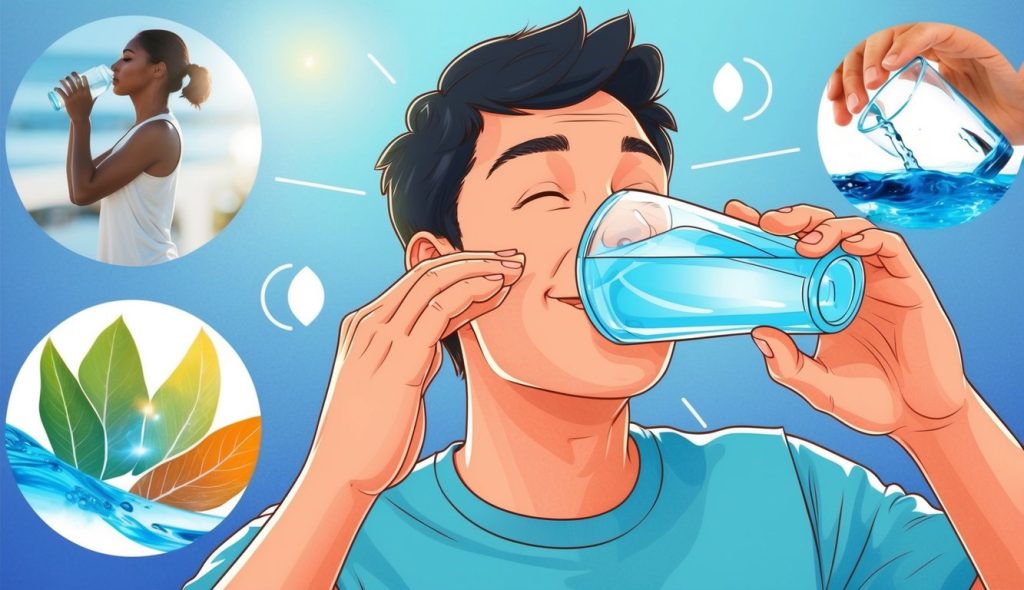The carnivore diet, characterized by its focus on animal-based foods, has gained attention for its potential health benefits. While much emphasis is placed on the types of meat consumed, the role of pure water in this dietary regimen is often overlooked. Pure water plays a crucial role in supporting optimal health and function for those following a carnivore diet.
Proper hydration becomes particularly important on a carnivore diet due to its low carbohydrate content. As the body depletes its glycogen stores, water loss increases, making it essential to replenish fluids regularly. Pure water helps maintain electrolyte balance, supports digestion, and aids in the elimination of waste products from protein metabolism.
Choosing the right type of water can enhance the benefits of a carnivore diet. Mineral-rich water sources can provide essential nutrients like calcium, magnesium, and potassium, which may be limited in an all-animal-food diet. Adequate hydration also supports mental clarity and energy levels, helping individuals adhere to their dietary goals and experience the full potential of the carnivore lifestyle.
The Importance of Hydration in a Carnivore Diet
Proper hydration is essential for those following a carnivore diet. It affects nutrient absorption, digestion, and overall bodily functions. Recognizing the signs of dehydration and understanding specific hydration needs are crucial for maintaining optimal health on this diet.
Understanding Hydration Needs
Carnivore diets require careful attention to water intake due to their high protein content. Protein metabolism demands more water than other macronutrients. Without water-rich fruits and vegetables, carnivore dieters must consciously increase their fluid consumption.
A general guideline is to drink water when thirsty, but this may not be sufficient. Monitoring urine color can help gauge hydration status. Pale yellow indicates adequate hydration, while dark yellow suggests a need for more fluids.
Electrolyte balance is crucial on a carnivore diet. Sodium, potassium, and magnesium levels can be affected by increased water intake and the absence of plant-based foods. Adding salt to meals or consuming bone broth can help maintain proper electrolyte levels.
Signs of Dehydration
Recognizing dehydration symptoms is vital for carnivore dieters. Common signs include:
- Thirst
- Dry mouth
- Dark urine
- Fatigue
- Headaches
- Dizziness
More severe dehydration may cause:
- Rapid heartbeat
- Confusion
- Low blood pressure
- Fainting
Monitoring these symptoms helps prevent dehydration-related complications. Carnivore dieters should pay extra attention to their body’s signals, as the diet’s composition can mask early dehydration signs.
Water’s Role in Nutrient Absorption and Digestion
Water plays a critical role in nutrient absorption and digestion on a carnivore diet. It aids in breaking down proteins and fats, the primary components of this diet.
Adequate hydration supports:
- Enzyme production for protein digestion
- Bile production for fat breakdown
- Nutrient transportation throughout the body
- Waste removal from cells
Without sufficient water, digestive processes can slow down, leading to constipation and reduced nutrient absorption. This is particularly important on a carnivore diet, where efficient protein and fat metabolism are crucial.
Proper hydration also helps maintain kidney function, which is essential for processing the higher protein intake typical of carnivore diets. It assists in flushing out metabolic waste products and preventing kidney strain.
Electrolytes and the Carnivore Diet
Electrolytes play a vital role in maintaining bodily functions for those following a carnivore diet. Proper electrolyte balance is essential for hydration, muscle function, and nerve transmission.
Electrolyte Balance and Meat Consumption
Meat consumption directly impacts electrolyte levels in the body. Animal products are rich sources of sodium, potassium, and magnesium. These minerals are crucial for maintaining fluid balance and supporting various physiological processes.
The carnivore diet’s high protein content can affect kidney function, potentially altering electrolyte excretion. This may lead to changes in electrolyte balance, particularly during the initial adaptation phase.
Sodium retention may increase on a carnivore diet due to lower insulin levels. This can result in a temporary increase in sodium excretion, necessitating adequate salt intake to maintain balance.
Sources of Essential Minerals
Animal products provide a range of essential minerals on a carnivore diet. Beef, pork, and poultry are excellent sources of sodium, potassium, and magnesium.
Organ meats, such as liver and kidney, are particularly rich in minerals. They offer higher concentrations of electrolytes compared to muscle meat.
Fish and seafood contribute significantly to electrolyte intake. They provide sodium, potassium, and trace minerals like iodine and selenium.
Bone broth is a valuable source of electrolytes on a carnivore diet. It contains minerals leached from bones during the cooking process.
Supplementing Electrolytes on a Carnivore Diet
While animal products provide electrolytes, some individuals may require supplementation. This is especially true during the initial adaptation phase or for those engaging in intense physical activity.
Salt supplementation is often recommended to maintain sodium levels. Adding sea salt or pink Himalayan salt to meals can help replenish sodium lost through increased excretion.
Magnesium supplements may be beneficial for some carnivore dieters. Topical magnesium oil or magnesium glycinate supplements are popular options.
Electrolyte powders or tablets can be useful for quick replenishment. It’s important to choose supplements free from additives or fillers to align with carnivore diet principles.
Drinking Water Quality and Sources

Water quality and source selection are vital considerations for those following a carnivore diet. Proper hydration supports nutrient absorption and overall health on this meat-focused regimen.
Filtered vs Spring vs Distilled Water
Filtered water removes contaminants while retaining beneficial minerals. It’s a popular choice for carnivore dieters seeking clean hydration. Spring water, sourced from natural springs, contains trace minerals that can support electrolyte balance.
Distilled water, stripped of all minerals, is the purest form but may lack essential elements. Some carnivore diet followers prefer distilled water for its purity, while others opt for mineral-rich alternatives.
Tap water quality varies by location. In areas with high-quality municipal water, it can be a cost-effective option. However, many choose to filter tap water to remove potential contaminants.
Water Retention and Different Water Types
Water retention varies among different water types. Mineral water, rich in electrolytes, may enhance hydration and support fluid balance. This can be particularly beneficial for carnivore dieters, who may need additional electrolytes.
Spring water’s mineral content can aid in water retention and provide trace nutrients. Filtered water, depending on the filtration method, may retain some minerals that support hydration.
Distilled water, lacking minerals, may not be retained as effectively by the body. Some carnivore dieters add trace mineral drops to distilled water to improve retention and mineral intake.
Water Consumption and Carnivore Diet Lifestyle
Proper hydration is essential for those following a carnivore diet. Water intake affects energy levels, athletic performance, and weight management on this high-protein regimen.
Daily Water Intake Recommendations
The carnivore diet’s high protein content necessitates increased water consumption. A general guideline is to drink 30-40 ml of water per kilogram of body weight daily. For a 70 kg individual, this translates to 2.1-2.8 liters of water per day.
Factors like climate and activity level can influence these needs. Some carnivore dieters report feeling less thirsty due to reduced carbohydrate intake. It’s crucial to monitor urine color as an indicator of hydration status. Pale yellow urine suggests adequate hydration.
Electrolyte balance is vital on a carnivore diet. Consider adding salt to water or consuming bone broth to maintain proper mineral levels.
Adjusting Fluid Intake for Activity Levels
Physical activity increases fluid requirements for carnivore dieters. Athletes and those engaging in strenuous exercise should drink additional water to compensate for sweat loss.
A good practice is to weigh oneself before and after exercise. For each pound of weight lost during activity, consume 16-24 ounces of water. This helps maintain hydration and supports recovery.
During extended workouts, sipping water throughout the session is advisable. Post-exercise hydration is equally important. Rehydrating promptly aids in muscle recovery and maintains energy levels.
Hydration and Weight Management
Proper hydration plays a role in weight management for carnivore dieters. Water can help control appetite and support the body’s fat-burning processes.
Drinking water before meals may reduce calorie intake by promoting a feeling of fullness. This can be particularly beneficial for those using the carnivore diet for weight loss.
Adequate hydration also supports the body’s ability to metabolize fat. Dehydration can slow down metabolic processes, potentially hindering weight loss efforts.
Consistency in water intake throughout the day is key. Keeping a water bottle handy and setting reminders can help maintain steady hydration levels.
Other Beverages and Their Effects on Hydration
Various beverages can impact hydration levels differently on a carnivore diet. While water remains the optimal choice, other drinks may offer benefits or drawbacks worth considering.
Pros and Cons of Coffee and Tea
Coffee and tea can contribute to daily fluid intake, but their effects on hydration are complex. Black coffee provides a mild diuretic effect, potentially increasing urine output. However, the fluid content typically outweighs this effect, resulting in net hydration.
Green tea offers similar hydration benefits to coffee, with added antioxidants. Both beverages contain caffeine, which may boost metabolism and enhance mental alertness.
On the downside, excessive consumption of coffee or tea can lead to caffeine-related side effects such as jitters or sleep disruption. Moderation is key when incorporating these beverages into a carnivore diet regimen.
| Beverage | Hydration Effect | Potential Benefits | Considerations |
|---|---|---|---|
| Coffee | Mildly diuretic | Mental alertness | Caffeine content |
| Green Tea | Net hydrating | Antioxidants | May affect iron absorption |
Impact of Alcohol on Hydration
Alcohol has a significant dehydrating effect on the body. It suppresses the production of antidiuretic hormone, leading to increased urine output and fluid loss. This can be particularly problematic for those following a carnivore diet, as they may already have higher hydration needs due to increased protein intake.
Consuming alcoholic beverages can also impair the body’s ability to regulate fluid balance. This effect is more pronounced with higher alcohol content drinks.
For individuals on a carnivore diet, it’s advisable to limit alcohol consumption and increase water intake to counteract its dehydrating effects. If alcohol is consumed, alternating with water or sparkling water can help maintain hydration levels.
Herbal Teas and Hydration
Herbal teas offer a flavorful alternative to plain water while contributing to overall hydration. Unlike traditional teas, most herbal varieties are caffeine-free, making them suitable for evening consumption without disrupting sleep patterns.
Many herbal teas, such as chamomile or peppermint, can be enjoyed hot or cold, providing versatility in beverage options on a carnivore diet. Some blends may offer additional benefits, such as aiding digestion or promoting relaxation.
It’s important to choose unsweetened herbal teas to align with carnivore diet principles. Steeping times can affect flavor intensity without impacting hydration benefits. While herbal teas can supplement water intake, they should not completely replace pure water in the diet.
Hydration’s Influence on Health and Performance

Proper hydration is essential for optimal bodily functions, affecting both physical and mental performance. It impacts cognitive abilities, muscle function, and kidney health in significant ways.
Hydration for Cognitive Function and Mental Clarity
Adequate hydration is crucial for maintaining mental sharpness and cognitive performance. Even mild dehydration can lead to decreased concentration, slower reaction times, and impaired memory function.
Studies have shown that individuals who maintain proper hydration levels perform better on cognitive tasks compared to those who are dehydrated. Mental clarity and focus are directly linked to hydration status.
Dehydration can cause fatigue, dizziness, and difficulty concentrating. These symptoms can be alleviated by consuming sufficient water throughout the day.
Physical Performance and Muscle Function
Proper hydration is vital for physical performance and muscle function. Water plays a key role in regulating body temperature, transporting nutrients, and removing waste products during exercise.
Dehydration can lead to:
- Decreased endurance
- Reduced strength
- Impaired coordination
- Increased risk of heat-related illnesses
Athletes and fitness enthusiasts should pay close attention to their hydration levels before, during, and after physical activity. Adequate water intake helps maintain muscle elasticity and prevents cramping.
Hydration and Kidney Health
The kidneys play a crucial role in filtering waste products from the blood and maintaining fluid balance in the body. Proper hydration is essential for optimal kidney function.
Insufficient water intake can lead to:
- Increased risk of kidney stones
- Urinary tract infections
- Chronic kidney disease
Monitoring urine color is a simple way to assess hydration status. Pale yellow urine generally indicates adequate hydration, while dark-colored urine may signal dehydration.
Drinking enough water helps flush out toxins and prevents the buildup of minerals that can form kidney stones. It also supports the kidneys in their vital role of maintaining overall health and well-being.
Nutritional Considerations for Carnivore Dieters

Proper hydration interacts with key nutrients in the carnivore diet to support overall health. Understanding these relationships helps optimize nutritional intake and bodily functions.
Role of Protein in Hydration
Protein plays a crucial role in maintaining fluid balance on a carnivore diet. As the body metabolizes protein, it requires more water for proper digestion and waste removal. This increased water need helps flush out nitrogen waste products from protein breakdown.
Adequate hydration is essential for efficient protein metabolism. It aids in transporting amino acids to cells and supports the body’s ability to synthesize new proteins. Without sufficient water, protein utilization may be impaired.
Carnivore dieters should aim to drink water consistently throughout the day. This helps the body process high protein intakes more effectively and maintain electrolyte balance.
The Significance of Fats in Hydration
Fats are a primary energy source on the carnivore diet and impact hydration status. Healthy fats from meat and dairy can help retain water in the body.
Fat metabolism produces metabolic water as a byproduct. This internally generated water contributes to overall hydration. However, it does not eliminate the need for drinking water.
Some fatty meats and dairy products contain natural electrolytes. These help maintain fluid balance and support hydration. Examples include:
- Sodium in bacon and aged cheeses
- Potassium in beef and full-fat yogurt
- Magnesium in fatty fish
Balancing fat intake with adequate water consumption is key for carnivore dieters. This supports optimal nutrient absorption and metabolic function.
Influence of Water on Vitamins and Iron Uptake
Proper hydration is vital for the absorption and utilization of vitamins and minerals on a carnivore diet. Water acts as a solvent and transport medium for these nutrients.
Vitamin B12, abundant in animal products, requires adequate stomach acid for absorption. Staying hydrated helps maintain proper stomach acid levels, enhancing B12 uptake.
Iron absorption can be impacted by hydration status. Dehydration may reduce stomach acid production, potentially decreasing iron absorption from meat sources. Regular water intake supports optimal iron uptake.
Calcium absorption also benefits from proper hydration. Water helps transport calcium to cells and supports its integration into bones. This is particularly important for carnivore dieters who consume dairy products.
